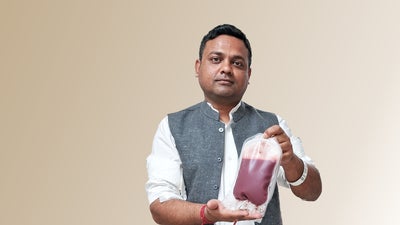How do family members play an important role during donation?
In India, we all know that family is an important institution that plays a central role in our lives. It provides love, support, and protection to all members of the family. This has been reinforced even more so in the current challenging times.
In India, we all know that family is an important institution that plays a central role in our lives. It provides love, support, and protection to all members of the family. This has been reinforced even more so in the current challenging times. But how important is it for them to know that you are registered as a stem cell donor and especially when you are called as a match?
Learning that you are a potential match may be exciting news for you. It might also make you a bit nervous and you may have many questions. While the DKMS-BMST coordinator is always there to support you and clear any doubts you have, it is equally important for you to discuss your decision with people in your family or those who you trust most. Having them by your side as you move forward with the donation procedure will give you the emotional support and confidence you need to be in a positive mental state.
THINK IT OVER, TALK IT OVER.
When you get the call that you are a match, is a good starting point for explaining the basics to your family/friends —what blood stem cell donation is, the blood stem cell donation method, and how a transplant from a healthy person like you can save a life. It’s important for family and friends to know the personal side of your decision— your motivations and convictions—so they can provide better support.
Some good ways to do this include:
- Explaining what inspired you to register
- Discussing why you are committed to donating
- Sharing how amazing it is that you so closely match a stranger
- Opening up about your fears and hopes about donating
- Sharing stories of other donors who have saved a life (click here to read some inspiring stories)
Having an open and honest conversation is the best way to clear doubts, misconceptions, and any other preconceived notions about donating. It also gives your family members confidence in you and comfort in knowing that you are aware of what you are about to do. Always, remember that donating is a big commitment and your physical and mental well-being is particularly important.
YOUR COMMITMENT MATTERS
Donating is a serious commitment and delays in your decision, or a donor search can be life-threatening to a patient. The first step in a transplant process is called conditioning. During this preparatory process, the patient receives chemotherapy and possibly radiation to destroy the cancerous cells. Chemotherapy is a treatment with anti-cancer drugs that disrupts cancer cells’ ability to grow and multiply in your body. Radiation therapy uses high-energy X-rays or beams to kill or stop cancer cells from growing and dividing. Radiation is often given in combination with chemotherapy. However, both of these treatments can have side effects. Chemotherapy can kill good blood cells and radiation suppresses the immune system. Once the patient is prepped, they are ready for the transplant.
Transplant day is a big day for the patient and their families. Often, they describe it as the first day of their new life. Once the body is prepared for a transplant, they must get the transplant, or the consequences are life-threatening. At this stage, if a donor backs out, it can be devastating not only to the patient in need but also to the entire family. Moving forward is entirely up to you. Therefore, we ask that you are completely ready, and your family members are on-board with your decision.
In most cases, your family members won’t know much about blood stem cell donation and maybe even surprised to learn that you registered as a potential donor. It is natural as they want to protect you and are worried about your safety. It is up to you to make them understand that what you are about to do can potentially save someone’s life.
Check out our next blog post to get some tips on how to navigate questions from your family members here.


